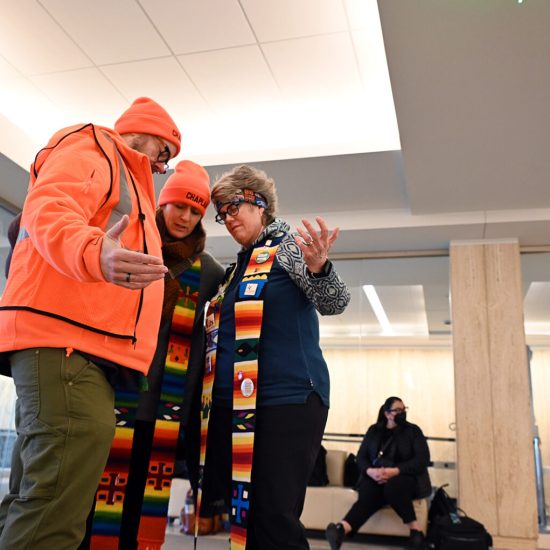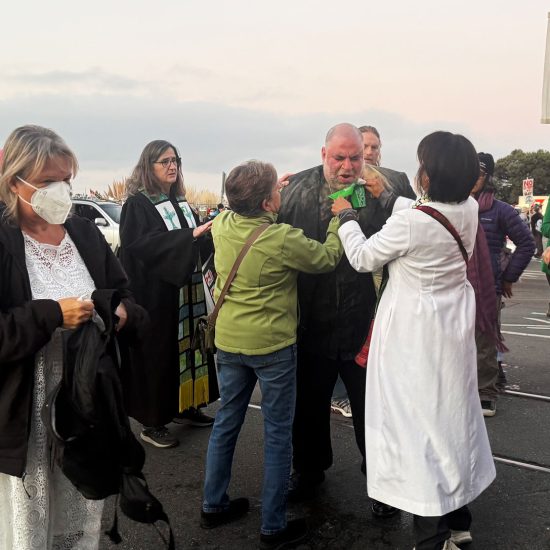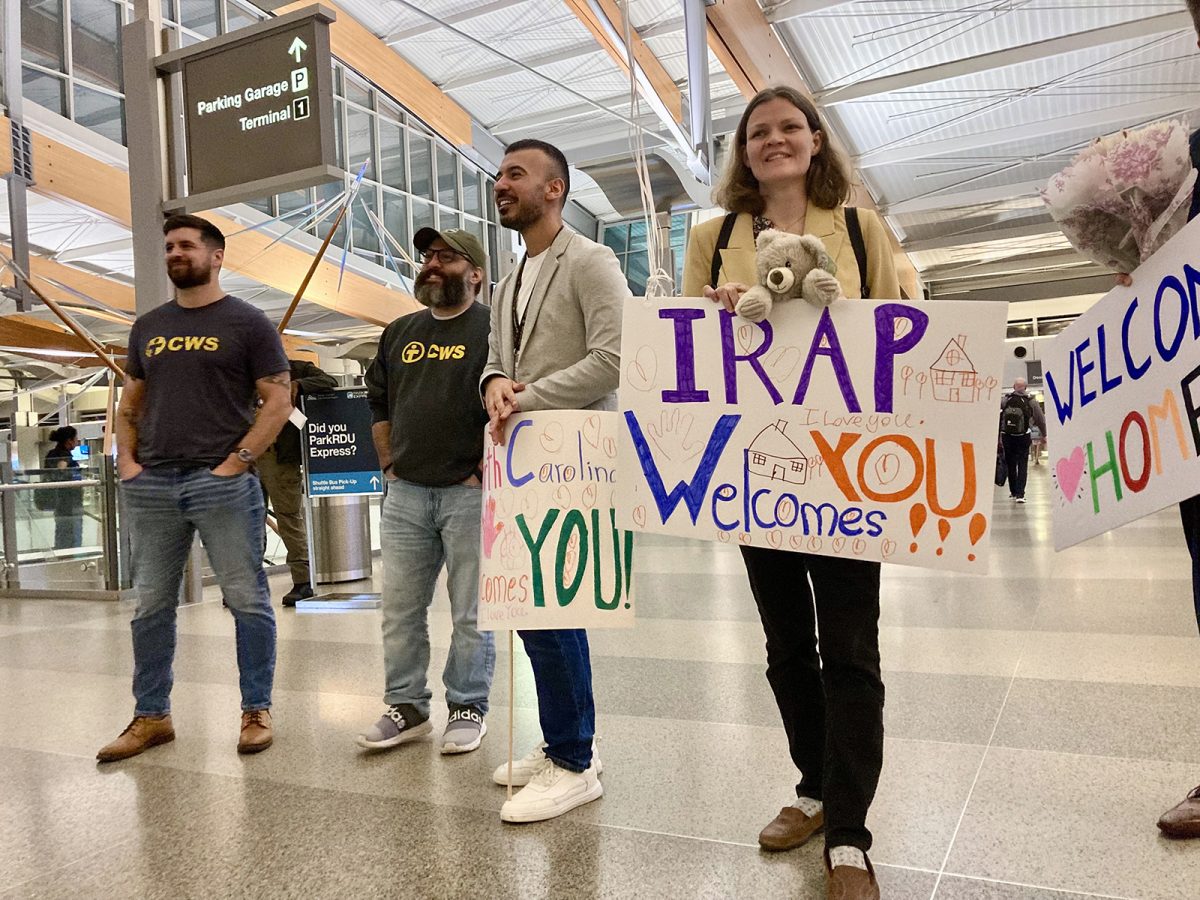
MORRISVILLE, N.C. (RNS) — Six months after his flight to the United States was abruptly canceled, the lead plaintiff in a lawsuit seeking to overturn President Trump’s freeze on the U.S. refugee program arrived at Raleigh-Durham International Airport Thursday (July 10), with his wife and 1-year-old son in tow.
Known in the legal filings by the alias Pacito to protect him from retaliation, the 22-year-old Congolese refugee was greeted by two lawyers for the International Refugee Assistance Project as well as several representatives of refugee resettlement agencies, who came with welcome signs, balloons, flowers, and a teddy bear. A few friends from the Democratic Republic of the Congo living in the area also came to welcome him.
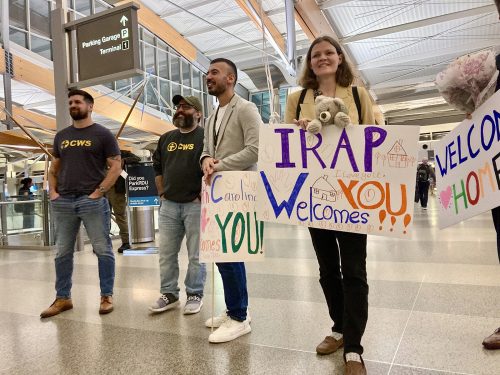
Kathleen List, director of global legal programs for the International Refugee Assistance Program, along with several representatives from Church World Service were on hand at Raleigh-Durham International Airport on Thursday, July 10, 2025, to greet a Congolese refugee, who goes by “Pacito,” and his family who arrived in the United States. (RNS photo/Yonat Shimron)
Over the past year, Pacito and his wife underwent multiple interviews, medical exams and security screenings ahead of their planned departure to the U.S. on Jan. 22. They had sold all their belongings, given up their rental home and arrived at a transit center in Nairobi on Jan. 21, only to be told that their overnight flight to the U.S. was canceled.
Trump’s Jan. 20 executive order freezing refugee admissions was supposed to go into effect on Jan. 27, but according to the case, Pacito v Trump, the U.S. State Department began canceling refugee flights preemptively.
Instead of flying to the U.S., the family slept in the transit center’s parking lot, along with eight or nine other families whose flights had also been canceled.
Pacito fled the Democratic Republic of the Congo in 2016 when he was 13 due to violence and political instability. He and his parents spent four days on the run, finally arriving in Kenya, where he has lived since. His wife is also a refugee from the DRC.
On Thursday, in a brief interview at the airport, Pacito said he was relieved to finally be on U.S. soil. Pacito said he wasn’t sure the lawsuit was “gonna make any change to Trump’s order, but, thank God, thank God, now we are here.
“I feel like I’m blessed,” he said. “I was actually hopeless. The minute the court said they’re going to process my case again, I was reborn. My energy was up again, I felt like now there is hope for the future.”
On Feb. 10, three faith-based refugee resettlement agencies — HIAS, Church World Service, and Lutheran Community Services Northwest — joined a suit by the International Refugee Assistance Project challenging the administration’s executive order freezing funding for refugee resettlement partners.
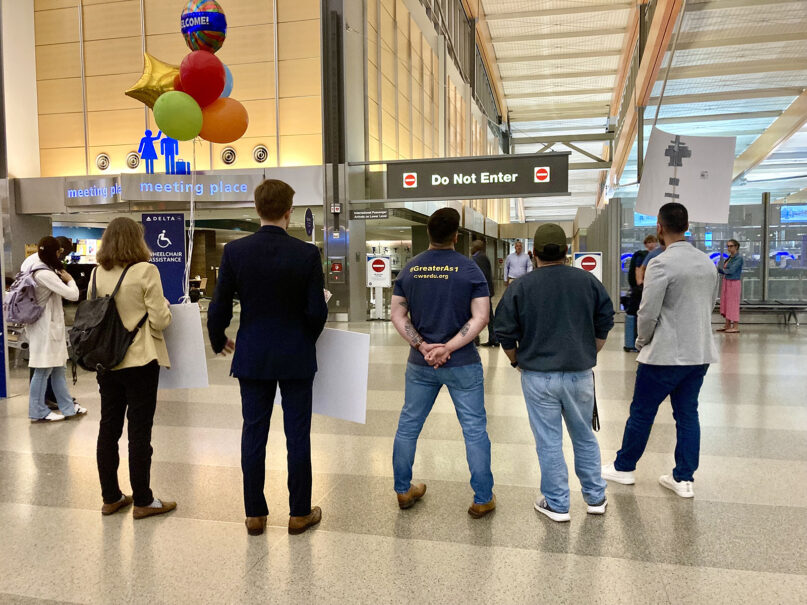
A group waits to greet a Congolese refugee, who goes by “Pacito,” and his family at Raleigh-Durham International Airport on Thursday, July 10, 2025, in Morrisville, N.C. (RNS photo/Yonat Shimron)
Since then, a judge issued a preliminary injunction ordering the government to immediately admit 160 refugees whose travel plans had been booked between Jan. 20 and Jan. 27. About 40 individuals have since arrived in the U.S. The State Department confirmed that a total of 10 refugees arrived last week, including Pacito, his wife, and son. Another 80 of the 160 are again in limbo because they are residents of the seven countries barred from entry by Trump’s travel ban.
The Congolese refugee said in a court document that he has an aunt in Iowa and a cousin in Tennessee. On Thursday he told an RNS reporter he initially asked to be resettled in Tennessee and was unclear about why his request didn’t work out but is happy to now be resettled in North Carolina. The Raleigh office of the U.S. Committee for Refugees and Immigrants, one of eight remaining resettling agencies after the Catholic and Episcopal churches ended their contract with the federal government, is resettling the family.
“While we’re really overjoyed that plaintiff Pacito, at long last, has been able to be resettled in the United States,” said Melissa Keaney, senior supervising attorney for the International Refugee Assistance Project’s legal department, “it’s a reminder of the many thousands of others who have not received any information or seen any movement in their cases, even as there have been multiple court orders for the government to resume processing a subset of these cases.”
Approximately 120,000 conditionally approved refugees are awaiting resettlement to the United States. A district court narrowed that number and ordered the Trump administration to admit around 12,000 refugees who already had “arranged and confirmable” plans to travel to the United States before Jan. 20.
The appeals court later revised that order, instead requiring the government to immediately admit the subgroup of 160 individuals.
Pacito said it’s important to better understand the plight of refugees.
“Someone who has never been a refugee cannot understand that refugees do suffer… they don’t even have basic things. But we pray and hope that this case will open the way for them and they get a chance to change their life.”



